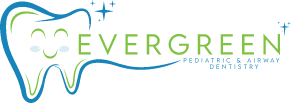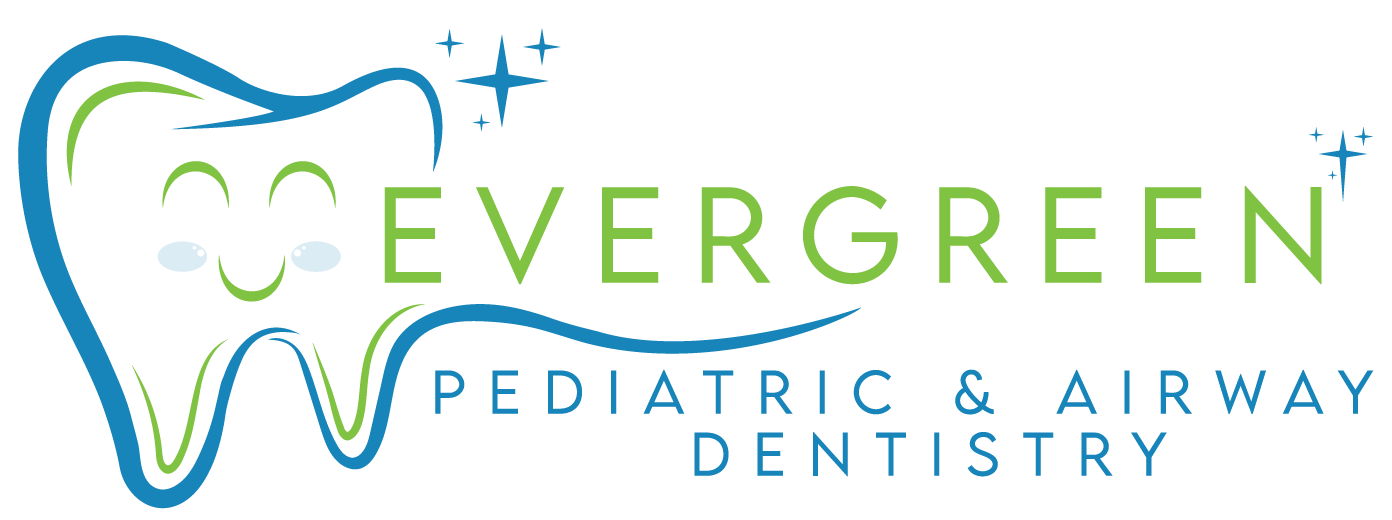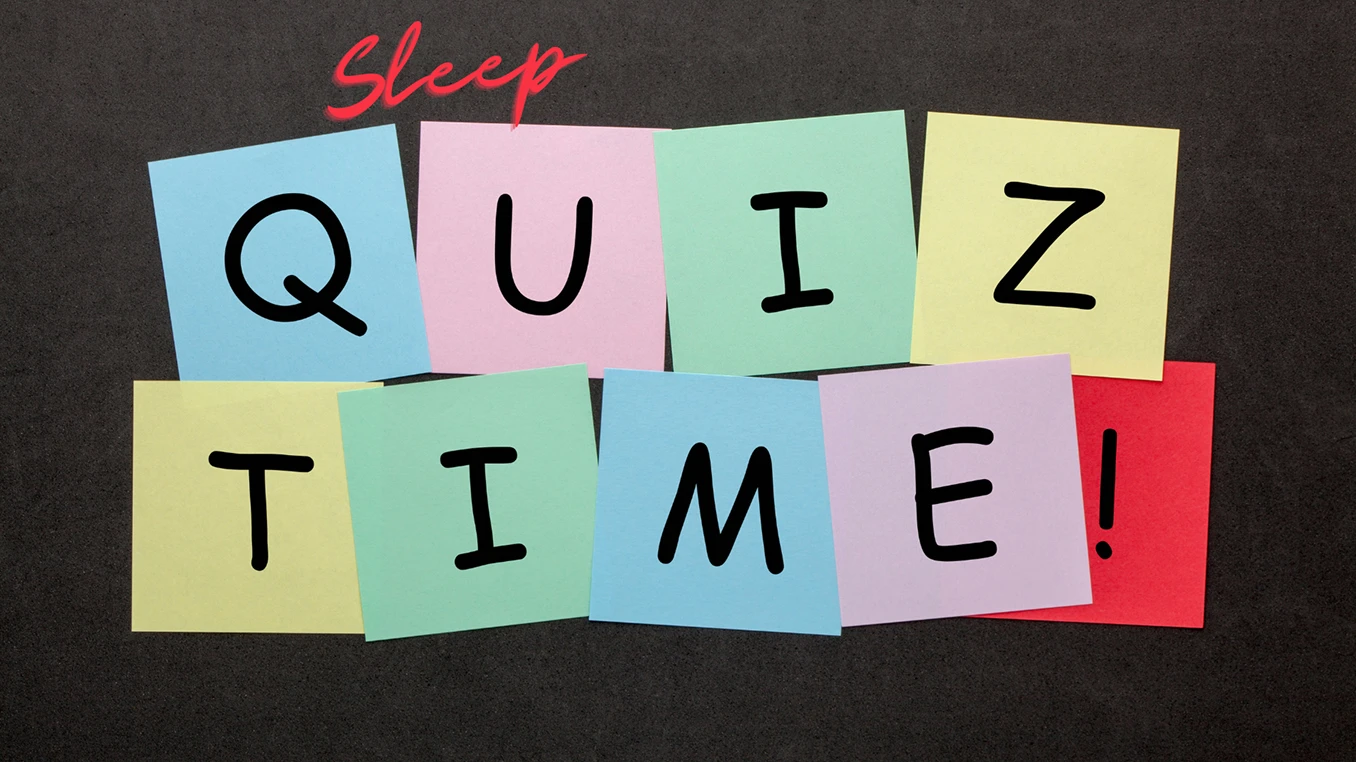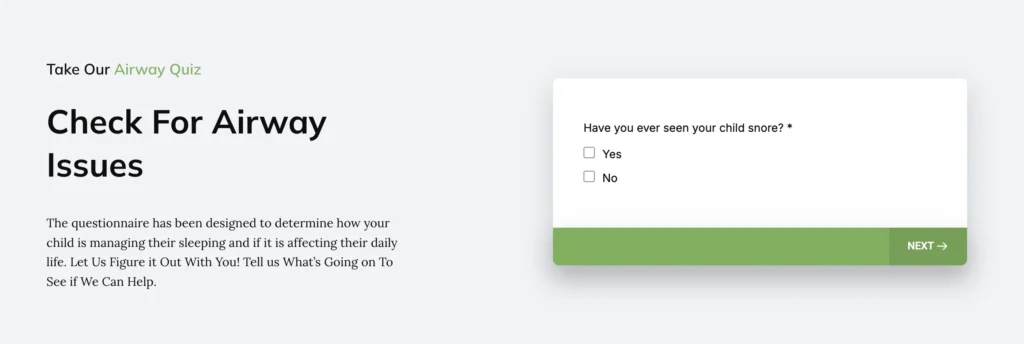Are you looking for a “do I have sleep apnea quiz” in Kirkland WA for your child? A lot of parents are!
If your child is waking up and feeling exhausted, despite a full night’s sleep, it can be confusing. You might wonder, “Could it be sleep apnea?” Many people aren’t familiar with this condition, even though it’s common. Sleep apnea happens when your breathing repeatedly stops and starts while you sleep.
It sounds a bit unsettling, doesn’t it? But recognizing the signs early can make all the difference. This isn’t just about loud snoring or grogginess—it’s about your child’s health and well-being. Let’s break down what pediatric sleep apnea and airway problems are and how spotting the signs is the first step toward restful sleep.
Key Symptoms of Sleep Apnea
Sleep apnea can be hard to notice since the primary symptoms occur while your child is asleep. Still, there are several signs that can hint at the condition. If any of these sound familiar, it may be worth exploring further:
- Constant Fatigue: You still feel tired after a full night’s rest.
- Loud Snoring: More than a nuisance—it could signal blocked airways.
- Pauses in Breathing: Often noticed by others, where your breathing stops momentarily.
- Waking Up Gasping: You might wake feeling like you can’t breathe.
- Morning Headaches: Poor sleep quality often results in headaches.
- Mood Changes and Irritability: Lack of sleep affects your emotional balance.
- Difficulty Concentrating: Daytime focus can be hard to maintain with disrupted sleep.
If these symptoms resonate, our free sleep quiz may help determine if you could be dealing with sleep apnea. Taking the quiz could be the first step toward restful nights and better health.
How Can I Check for Sleep Apnea?
Two main options are available to determine if your child has sleep apnea or an airway problem: an at-home test or an in-lab sleep study. Here’s what each involves:
At-Home Sleep Test:
Convenient and comfortable.
In Your Own Bed: Use a simple, user-friendly device designed for home use.
Ease of Use: Wear the device overnight; it records essential sleep data such as breathing and oxygen levels without disturbing your rest.
Quick Results: Return the device the next day for analysis. The results provide insights into your sleep patterns.
In-Lab Sleep Study:
More comprehensive.
Professional Monitoring: Spend the night in a sleep center where specialists observe your sleep, tracking brain activity, breathing, and more.
Detailed Diagnosis: This provides a thorough look at your sleep, helping specialists tailor treatments effectively.
Choosing between an at-home test and an in-lab study often depends on your symptoms and personal needs. Ready to explore further? Start with our free sleep quiz to see if you may have signs of sleep apnea.
Can I Test Myself for Sleep Apnea?
While self-diagnosing your child is tempting, sleep apnea requires professional assessment. Specialized tools and expert analysis are essential to confirm this condition accurately.
However, our free online quiz is a great first step to assess your child’s risk level. Here’s what to expect:
- Instant Insight: Complete a quick questionnaire covering key symptoms and risk factors.
- Preliminary Assessment: Your answers provide a glimpse into your risk level for sleep apnea.
- Guided Next Steps: If your responses suggest potential sleep apnea, we’ll advise on further steps, whether that’s an at-home test or an in-lab study.
Taking this quiz can be a helpful way to start uncovering your child’s sleep health mysteries. Ready to take the first step?
Can My Apple Watch Detect Sleep Apnea?
The Apple Watch offers valuable health insights but isn’t designed to diagnose sleep apnea directly.
- Health Monitoring: It tracks heart rate, blood oxygen, and sleep patterns, offering clues about your sleep quality.
- Indirect Indicators: While it can monitor changes linked to sleep apnea, such as oxygen levels, it won’t provide a formal diagnosis.
- Helpful Tool: The Apple Watch can be a part of your health routine and may signal when it’s time to see a specialist.
While helpful, the Apple Watch is no substitute for a proper sleep study to diagnose sleep apnea.
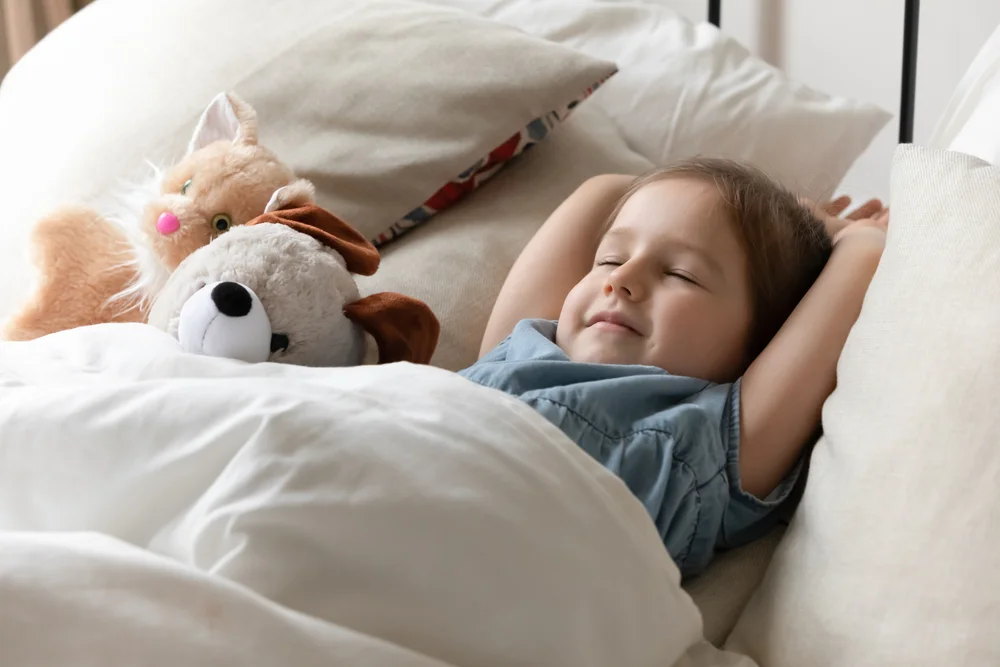 Does Snoring Mean Sleep Apnea?
Does Snoring Mean Sleep Apnea?
Is snoring always a sign of sleep apnea? It’s an essential question, but the answer isn’t straightforward.
- Common Symptom: Snoring often accompanies obstructive sleep apnea (OSA), indicating airflow blockage.
- Not Always Apnea: Snoring alone doesn’t confirm sleep apnea—it could be caused by factors like allergies or your sleep position.
- Other Indicators: Look for additional symptoms such as daytime tiredness, morning headaches, or waking up gasping.
- Professional Advice: Consistent snoring paired with other symptoms should be checked by a specialist to clarify what’s really going on.
Snoring might hint at sleep apnea, but only a professional diagnosis can tell for sure.
Why Diagnosing and Treating Sleep Issues Matters
Getting a proper diagnosis and treating sleep apnea is vital. Untreated, sleep apnea can bring more than just restless nights—it increases your child’s risk of severe health problems. Here’s why acting sooner is essential:
- Health Risks: Sleep apnea can lead to high blood pressure, heart disease, diabetes, and even stroke.
- Quality of Life: Beyond health, sleep apnea affects daily life, including mood, focus, and relationships.
- Preventative Action: Early diagnosis can prevent future health complications, setting you up for a better quality of life.
- Benefits of Treatment: Effective treatment can improve how you feel every day, with more energy and focus. It also lowers long-term health risks.
- Long-Term Wellness: Treating sleep apnea isn’t just about today—it’s an investment in a healthier future.
Addressing sleep apnea goes beyond reducing snoring; it’s about enhancing your health and happiness. Don’t delay getting checked out.
Take Action Now For Your Child’s Health!
At Evergreen Pediatric & Airway Dentistry, Dr. Susan Kim uses the latest tools to design custom treatments that meet your child’s unique needs. Addressing sleep apnea early on supports better sleep and fosters long-term health and development.
Here’s how we help your child:
- Thorough Exam: We look for signs of sleep disorders to understand what’s causing issues.
- Overnight Study: If needed, we conduct a take-home study to gather detailed data on sleep disruptions. This sleep study will be evaluated by a sleep specialist to see what’s really going on with your child’s health.
- Customized Treatment Plan: Dr. Susan crafts a custom plan to resolve specific problems, helping your child experience peaceful nights.
Ready to make a difference in your child’s sleep? Schedule an evaluation today.
Schedule Your Consultation Today!
Evergreen Pediatric Dentistry
https://www.google.com/maps?cid=14720788683151219551
12910 Totem Lake Blvd NE #103, Kirkland, WA 98034, United States
(425) 814-3196
https://evergreenkidsdentist.com/
 Questions & Answers on Sleep Tests
Questions & Answers on Sleep Tests
What is a sleep test?
A sleep test, or polysomnography, monitors various body functions during sleep to diagnose conditions like sleep apnea.
Are there different types of sleep tests?
Yes. In-lab sleep studies offer comprehensive insights, while at-home tests are more convenient but less detailed.
How do I know if I need a sleep test?
Symptoms such as excessive daytime tiredness, loud snoring, or breathing pauses during sleep may prompt the need for a sleep test.
Can I take a sleep test at home?
Yes, at-home tests are available, tracking breathing patterns, oxygen levels, and heart rate overnight.
What does an in-lab sleep study involve?
In-lab studies require a night at a sleep center where your sleep is monitored for brain activity, movement, and breathing.
How do I prepare for a sleep test?
Preparation may include avoiding caffeine and naps on the day of the test and following any specific instructions from the doctor.
What happens after a sleep test?
A sleep specialist will review the results to diagnose any disorders and discuss treatment options.
Are sleep tests covered by insurance?
Coverage varies, so check with your provider. Many insurers cover medically necessary sleep studies.
